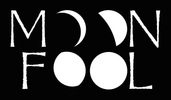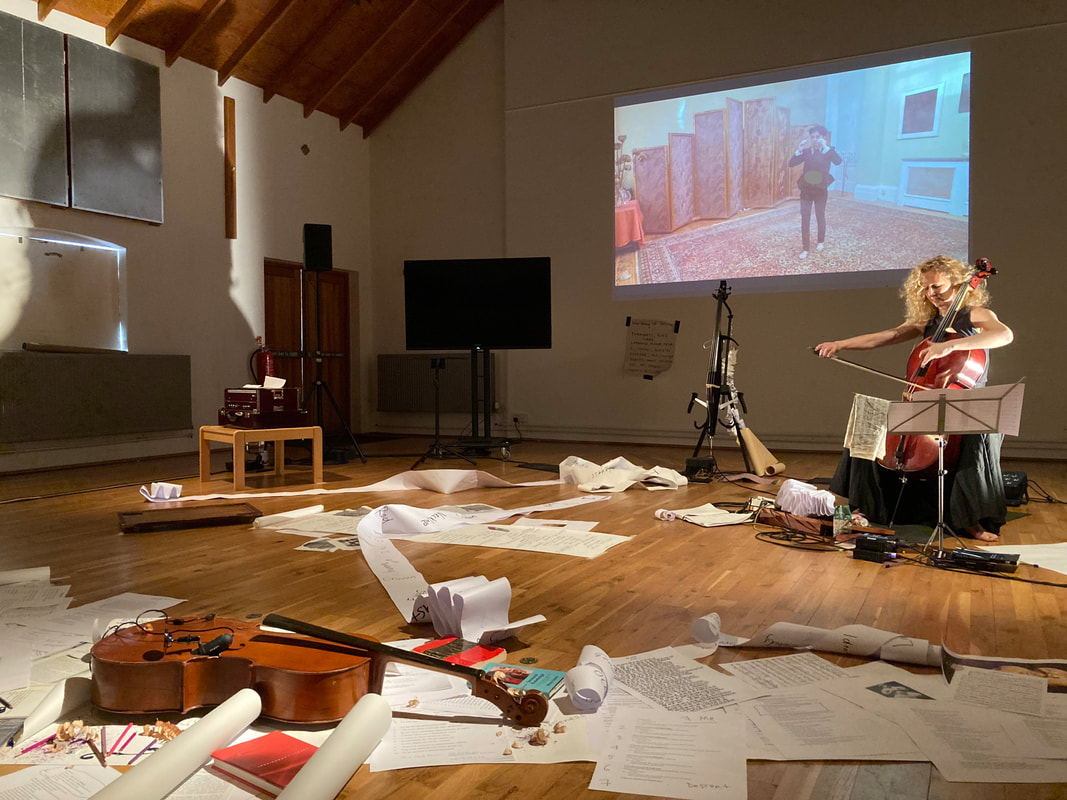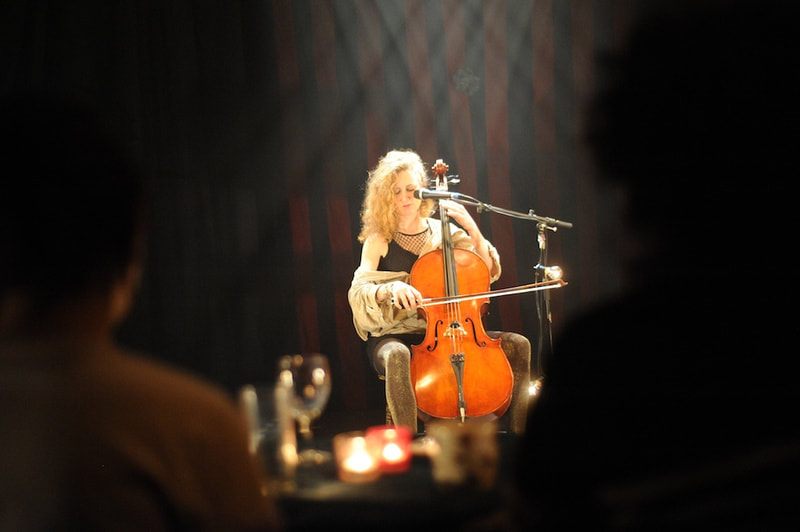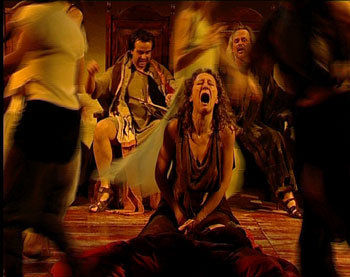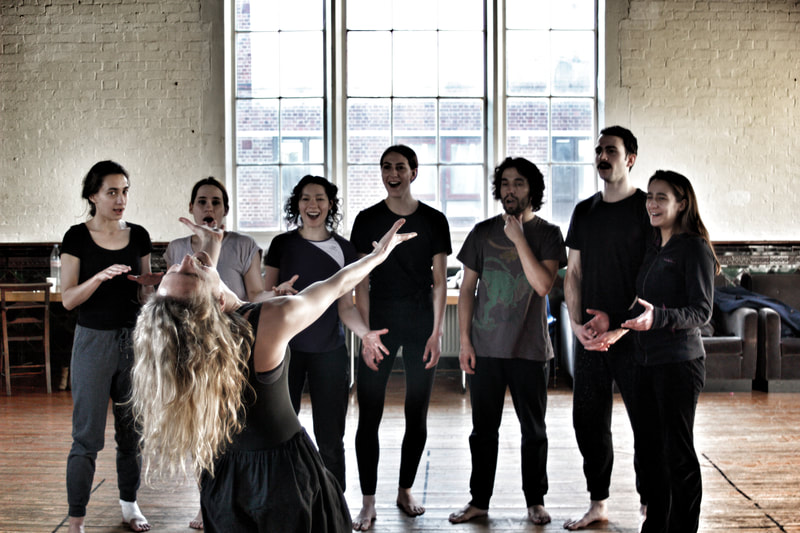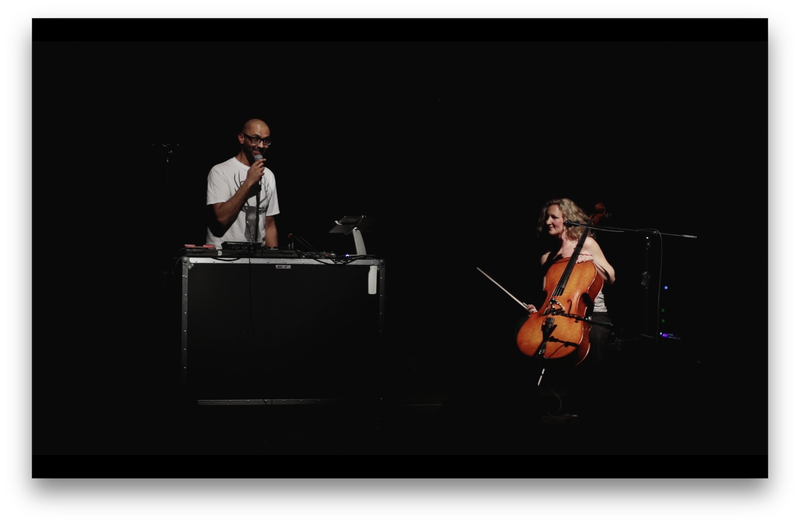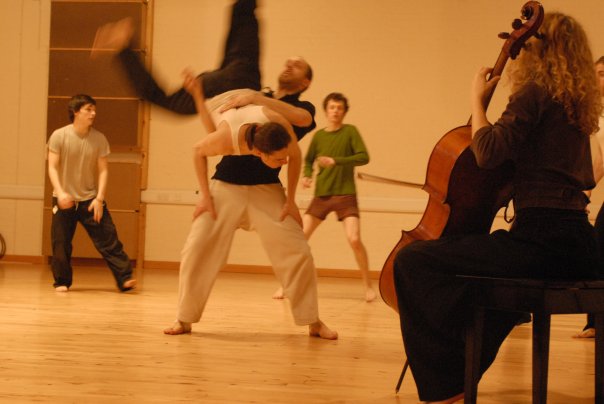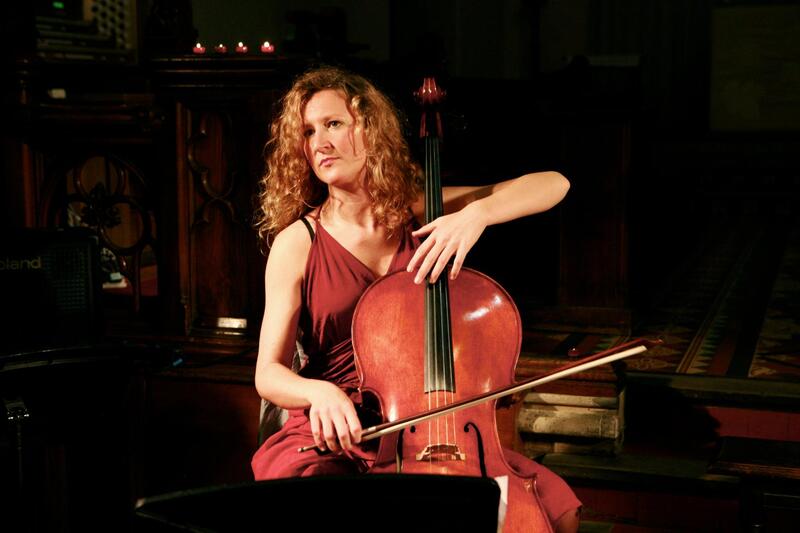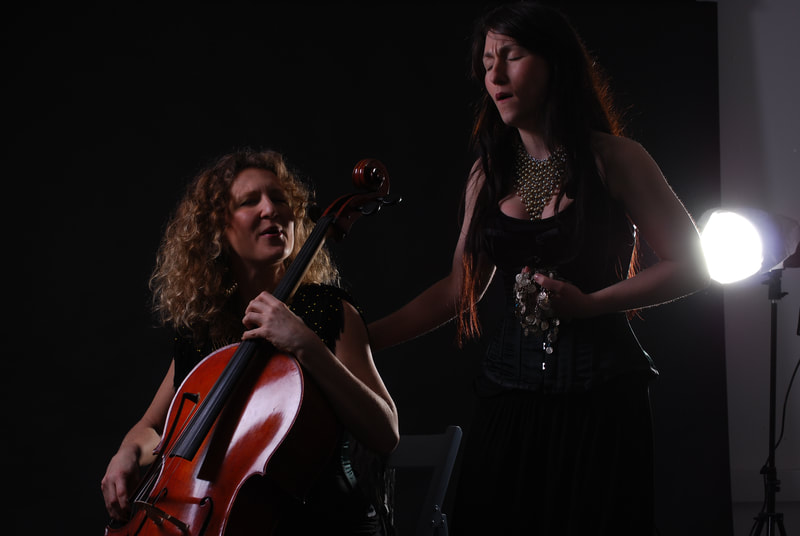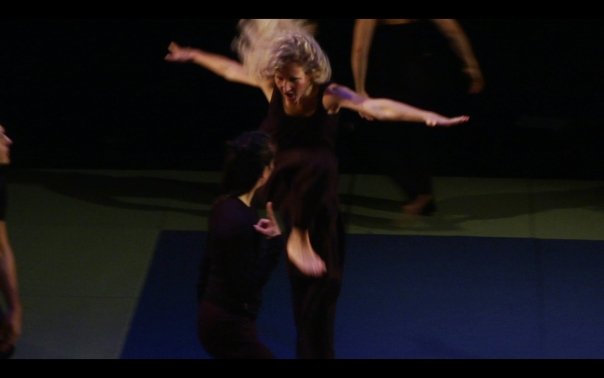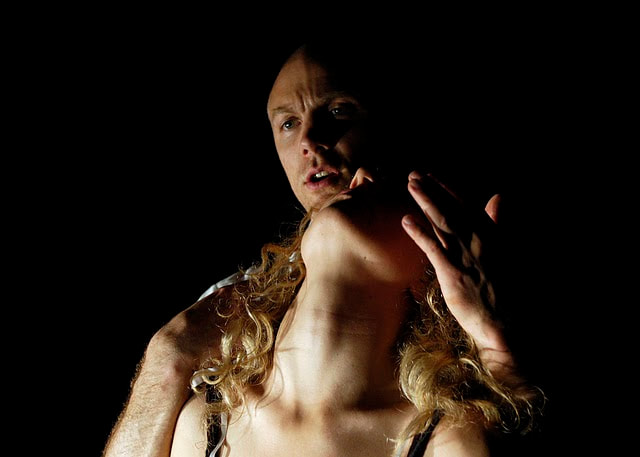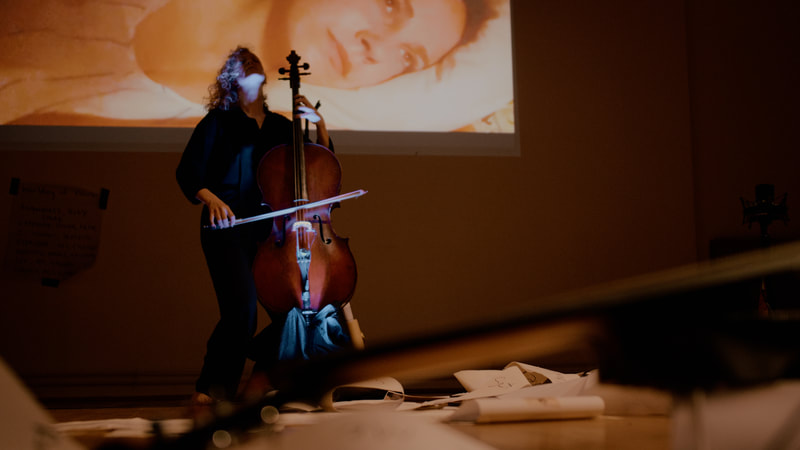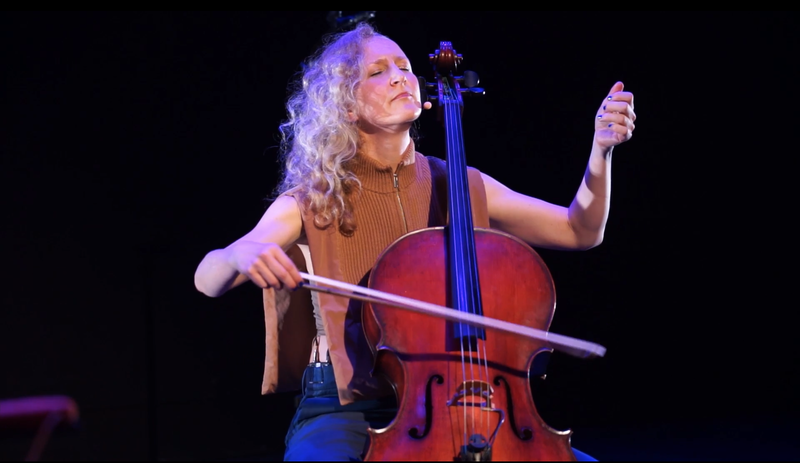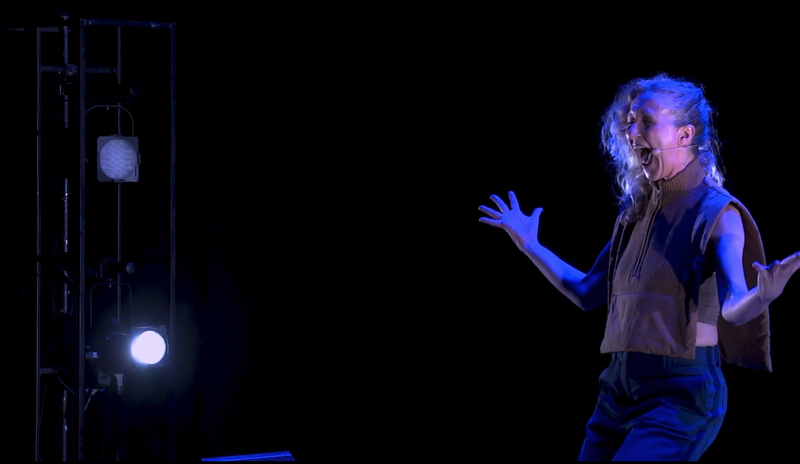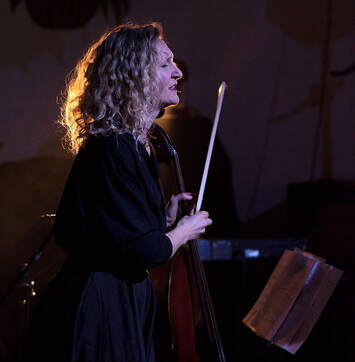
Anna-Helena McLean is a music, voice and theatre artist, as well as an international director and researcher. In 2010 Anna-Helena set up MOON FOOL to create a single platform through which to host a diversity of collaborative project taking place between UK, Europe, India and USA at the time. MOON FOOL became a host organisation for performances, educational work, music events and multimedia collaboration. Overtime the ACT INTERNATIONAL educational arm of the companies activity has moved into the foreground, highlighting the particular relevance of Anna-Helena's expertise in acting and voice training, integrated feminist ethics and bringing that into the context of industry facing performance work in UK.
Anna-Helena is a music theatre practitioner, coach and director, often working freelance as well studying for a PhD at the Guildhall School of Music & Drama. She most recently ran the voice practices for the BA Acting Studies course also at Guildhall School and directed her latest project, A Voice Lesson drawing inspiration from Virginia Woolf's Orlando: A Biography and commissioned though two Britten Pears Arts Residencies (2022 and 2023), a VASTA (Voice and Speakers Trainers Association) partnership (2022) and Arts Council England funding (2023).
Brought up in a travelling theatre company to a violin maker Father from Copenhagen, Anna-Helena found her way to Poland after graduating in Music, Theatre Studies and Drama (Performance) at Royal Holloway Uni of London in 2000 and under the mentorship of Alison Hodge (RADA). Further to initial collaboration with the Song of the Goat (Piesn Kozla) Theatre in Wroclaw, she went on to become the principal in Wlodzimierz Staniewski's interpretation of Euripides' 'Electra', touring extensively with the Gardzienice Theatre Company and leading its training around the world (Yale, New Haven; MIT, Boston; Columbia Uni, NYC). She was living and working in the rural Gardzienice village on the border between Poland and the Ukraine from 2000 to 2007 acting as a senior voice coach within the laboratory style work and ensemble company. During this time she also led the Ancient Greek Orchestra and the Academy for Theatre Practices. These experiences have been formative to Anna-Helena's unique approach to devising through ensemble practices - and within the Grotowskian Diaspora Laboratory tradition.
MOON FOOL was founded in 2004 as a platform for International Theatre and Music Exchange (with Dr. Rebecca Loukes and Cassie Friend at South Street Theatre in Reading who went on to form Red Cape Theatre). She began working with an arts and health organisation, the 'Awake Projects' Ensemble, Love Orchestra and Youth (2006-2012) while also developing her Polish experience through teaching and directing posts at Drama Schools (Rose Bruford College, Volda University College Norway, Edinburgh College, Norwegian Theatre Academy), Conservatoires (Royal Conservatoire of Scotland, Guildhall School of Music & Drama, Central School of Speech and Drama, National School of Drama Delhi, Yale School of Drama NYC), Universities (Exeter, Winchester, Huddersfield, Plymouth, Northampton, Falmouth, Sonoma State California) and with prominent artists (incl. Pamela Prather Coaching, Kathryn Hunter, Kirsty Housley, David Zakowski) and ensembles the world over (incl. Jocelyn Pook, National Theatre of Scotland, Walkabout Theatre Chicago, Penny Dreadful Productions).
In 2009 Anna-Helena coined the educational arm of Moon Fool's activity, 'ACTOR-CHORUS-TEXT' or the 'ACT' INTERNATIONAL. This name seeks to represent her original Voice and Performance Ensemble Practice and methodology for building an integrated ensemble as well as a unique approach to devising new materials or adapting classical texts. In 2014, she built her critically-acclaimed solo cabaret 'TITANIA' to showcase her long term work with Shakespeare, and in 2015 she generated MOON FOOL's first full-scale production using the ACT method. ‘STORM’ was an urban, music-led retelling of Shakespeare’s ‘The Tempest’ seen through the eyes of climate change (funded by Arts Council England, Vaults Festival London and MacArthur Foundation USA). Anna works with and through her ACT INTERNATIONAL research and educational outreach to develop the training and repertoire for each new work she produces. Using an organic, ensemble approach to performance practice and production her company is evolving and responsive to the individuals involved and the producing partners and most recently this has also worked with specific community groups including LGBTQIA+ and neurodivergent individuals. 'A Sonic Return to the Source - Inanna' was a solo concert of music reconstructed from Ancient Mesopotamian relics. Inanna overlapped with Anna-Helena's doctoral research into the lost voices of women through history. 'The Voice Lesson - A Performative Essay' developed the Inanna materials into a new-writing music driven work, materialised through commissioning opportunities from Britten Pears Arts, Arts Council England, Dartington Trust and VASTA USA. The final work is under development with The Identity Choir, Lossenham Farm and Lifesize CIC, to premiere in 2026 with a new libretto by Nazli Tabatabai-Khatambakhsh (Guildhall School, ROH), new writing by the company, directorial association with Elena Voce (Immersive Octopus) and original score composed by Anna-Helena.
In 2019, Anna began a Practice as Research PhD at Guildhall with supervisors Dr. Alex Mermikides (Former Research Programme Leader, Guildhall School and currently leading the Arts and Medicine programme at Kings College), Dr. Rachel Hann (Leader in the field of Trans Performance Lead at Northumbria University), Niamh Dowling (Principal of RADA) and Andy Lavender (Head of Production Arts Guildhall School). In her research she is navigating questions around feminist ethics, intensity and interpretation in the field of post-Grotowskian laboratory practices with a specific focus on the role of physiovocality as a feminist ethical tool for progressing inclusive approaches in contemporary performer training in the UK, after Me Too, more broadly. Building on 20 years at the forefront of British practitioners progressing Grotowski’s legacy, she has resolved to cultivate a practice-based means for women and other marginalised identities to discuss and communicate their contribution to - and creative agency within - the largely male director-dominated, binary bound, hierarchical canonic tradition.
Anna-Helena is a music theatre practitioner, coach and director, often working freelance as well studying for a PhD at the Guildhall School of Music & Drama. She most recently ran the voice practices for the BA Acting Studies course also at Guildhall School and directed her latest project, A Voice Lesson drawing inspiration from Virginia Woolf's Orlando: A Biography and commissioned though two Britten Pears Arts Residencies (2022 and 2023), a VASTA (Voice and Speakers Trainers Association) partnership (2022) and Arts Council England funding (2023).
Brought up in a travelling theatre company to a violin maker Father from Copenhagen, Anna-Helena found her way to Poland after graduating in Music, Theatre Studies and Drama (Performance) at Royal Holloway Uni of London in 2000 and under the mentorship of Alison Hodge (RADA). Further to initial collaboration with the Song of the Goat (Piesn Kozla) Theatre in Wroclaw, she went on to become the principal in Wlodzimierz Staniewski's interpretation of Euripides' 'Electra', touring extensively with the Gardzienice Theatre Company and leading its training around the world (Yale, New Haven; MIT, Boston; Columbia Uni, NYC). She was living and working in the rural Gardzienice village on the border between Poland and the Ukraine from 2000 to 2007 acting as a senior voice coach within the laboratory style work and ensemble company. During this time she also led the Ancient Greek Orchestra and the Academy for Theatre Practices. These experiences have been formative to Anna-Helena's unique approach to devising through ensemble practices - and within the Grotowskian Diaspora Laboratory tradition.
MOON FOOL was founded in 2004 as a platform for International Theatre and Music Exchange (with Dr. Rebecca Loukes and Cassie Friend at South Street Theatre in Reading who went on to form Red Cape Theatre). She began working with an arts and health organisation, the 'Awake Projects' Ensemble, Love Orchestra and Youth (2006-2012) while also developing her Polish experience through teaching and directing posts at Drama Schools (Rose Bruford College, Volda University College Norway, Edinburgh College, Norwegian Theatre Academy), Conservatoires (Royal Conservatoire of Scotland, Guildhall School of Music & Drama, Central School of Speech and Drama, National School of Drama Delhi, Yale School of Drama NYC), Universities (Exeter, Winchester, Huddersfield, Plymouth, Northampton, Falmouth, Sonoma State California) and with prominent artists (incl. Pamela Prather Coaching, Kathryn Hunter, Kirsty Housley, David Zakowski) and ensembles the world over (incl. Jocelyn Pook, National Theatre of Scotland, Walkabout Theatre Chicago, Penny Dreadful Productions).
In 2009 Anna-Helena coined the educational arm of Moon Fool's activity, 'ACTOR-CHORUS-TEXT' or the 'ACT' INTERNATIONAL. This name seeks to represent her original Voice and Performance Ensemble Practice and methodology for building an integrated ensemble as well as a unique approach to devising new materials or adapting classical texts. In 2014, she built her critically-acclaimed solo cabaret 'TITANIA' to showcase her long term work with Shakespeare, and in 2015 she generated MOON FOOL's first full-scale production using the ACT method. ‘STORM’ was an urban, music-led retelling of Shakespeare’s ‘The Tempest’ seen through the eyes of climate change (funded by Arts Council England, Vaults Festival London and MacArthur Foundation USA). Anna works with and through her ACT INTERNATIONAL research and educational outreach to develop the training and repertoire for each new work she produces. Using an organic, ensemble approach to performance practice and production her company is evolving and responsive to the individuals involved and the producing partners and most recently this has also worked with specific community groups including LGBTQIA+ and neurodivergent individuals. 'A Sonic Return to the Source - Inanna' was a solo concert of music reconstructed from Ancient Mesopotamian relics. Inanna overlapped with Anna-Helena's doctoral research into the lost voices of women through history. 'The Voice Lesson - A Performative Essay' developed the Inanna materials into a new-writing music driven work, materialised through commissioning opportunities from Britten Pears Arts, Arts Council England, Dartington Trust and VASTA USA. The final work is under development with The Identity Choir, Lossenham Farm and Lifesize CIC, to premiere in 2026 with a new libretto by Nazli Tabatabai-Khatambakhsh (Guildhall School, ROH), new writing by the company, directorial association with Elena Voce (Immersive Octopus) and original score composed by Anna-Helena.
In 2019, Anna began a Practice as Research PhD at Guildhall with supervisors Dr. Alex Mermikides (Former Research Programme Leader, Guildhall School and currently leading the Arts and Medicine programme at Kings College), Dr. Rachel Hann (Leader in the field of Trans Performance Lead at Northumbria University), Niamh Dowling (Principal of RADA) and Andy Lavender (Head of Production Arts Guildhall School). In her research she is navigating questions around feminist ethics, intensity and interpretation in the field of post-Grotowskian laboratory practices with a specific focus on the role of physiovocality as a feminist ethical tool for progressing inclusive approaches in contemporary performer training in the UK, after Me Too, more broadly. Building on 20 years at the forefront of British practitioners progressing Grotowski’s legacy, she has resolved to cultivate a practice-based means for women and other marginalised identities to discuss and communicate their contribution to - and creative agency within - the largely male director-dominated, binary bound, hierarchical canonic tradition.
